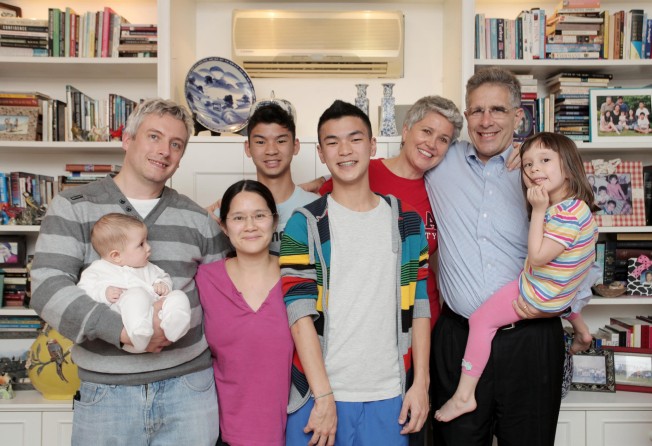Big hearts and open arms the key to a happy family

It all started with a nervous long-distance phone call.
"How would you like to have a 13-year-old daughter?" Gretchen Ryan asked her husband Jeff, who was on a business trip to Tokyo.
What Jeff didn't know was that his wife had already agreed that little Joanna was to become part of the family.
That was 25 years ago and today, Joanna is 38, married and settled in England with two little girls of her own.
"When I got into the family, I didn't know what to expect. I was a challenge, I must admit. I was a teenager," Joanna said.
Jeff and Gretchen soon welcomed four more children into their family - Tanya, now 21, Torrey, 20, Joseph (Joey) and Joshua (Josh), who are biological brothers now aged 18 and 16.
As her family grew, Gretchen, 51, became involved with Mothers' Choice, an NGO which takes in children and helps find them permanent homes, and is a staunch supporter of adoption - a concept that still met some resistance in Hong Kong because of social stigma, she said.
There are only three government-recognised NGOs helping with the adoption process. And last year only 128 children were adopted in Hong Kong, 20 of them went to families overseas.
"We are a living advertisement, for adoption. We want to be open because we want to educate [people] about [adoption]," Gretchen said.
"I mean we cannot really hide it." She and Jeff are white and their children are all Asian. "We're forced to be open [about adoption] because we look different. But it has allowed people to come in to support us."
Having no blood-ties did not make them love less, nor make them less of a family, she said.
As the family - apart from Tanya and Torrey, who are studying overseas - congregated in the Ryans' living room, there is no mistaking they are in every sense of the word a family.
The siblings talked about washing the car to get more pocket money, of writing up budgets - something their banker father insisted on going through with each child, outdoor hikes, games and sports.
Jeff, 55, said it was tough when the couple found out that their son Torrey had cerebral palsy. At six months, the couple detected odd behaviour and MRI scans confirmed there was brain damage. Doctors predicted that Torrey may not walk or talk, and would not live for long.
"I realised it was going to be challenging for a lifetime. We didn't need to go through with the adoption, but [Torrey] was already living in our home and part of the family, so there was no question about it," said Jeff. "Then he exceeded every one of those doctors' comments."
Today, Torrey attends university in the United States and is the best basketball player in the family. He still has problems keeping his balance and falls over easily, and speaking can be hard for him, but he has been an inspiration to everyone around him, Jeff said.
At the end of 2012, there were 110 children waiting for adoption - among them 71 with disabilities and 18 with health issues.
With the community still wary and sometimes prejudiced against the concept of adoption, the situation only gets worse if a child has disabilities, Gretchen said. Many of those children never find a family.
Each child recalled when they first realised that their family was different from many around them, and had wondered about their birth mothers. "I questioned it when I was about 16, for a brief moment," said Joanna, but chose to let it go. "I've got this wonderful family and I didn't really need to see [who my birth parents were] so I didn't pursue it. It wasn't going to change anything."
At first, Joey did not notice the racial difference. "When my mum told me, I didn't care. I always thought I was somewhere in between, because my older brother [Torrey] is Filipino so he's really dark and then my parents are really white, so I always thought I was in between," he said.
"I don't think it was a big deal for us," added Josh. "My parents love me unconditionally."
Both brothers said they were accepted in school, but there were still curious questions and sometimes it got tiring needing to explain it over and over again.
There are often myths that adopted parents will never be like "real" parents, or adoptive children will never be "real" children as they are not bound by blood, but Gretchen disagrees.
Joey echoed his mother's sentiments. "Both sets of parents love the child equally, because one's willing to give it up, potentially for a better chance of life in some cases or because she couldn't support him," he said.
"The other set of parents - the adoptive parents - love them enough to care for them, to take them in, to raise them. I think it's a misconception [that adoptive parents are not real and would never love you more]."
Joey said he could talk about anything with his parents, which most people found to be even stranger than being adopted.
"In adoption, everyone goes through the pain of loss," Gretchen said. "The child loses [his or her] birth parents, and as parents we lose being able to give birth to that child. But after that it's about healing; of overcoming the loss, and embracing each other as family. It's about having a thankful heart and passing that on to your children. Even when there are bad times, we remember the things for which we can be thankful."